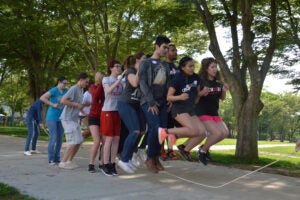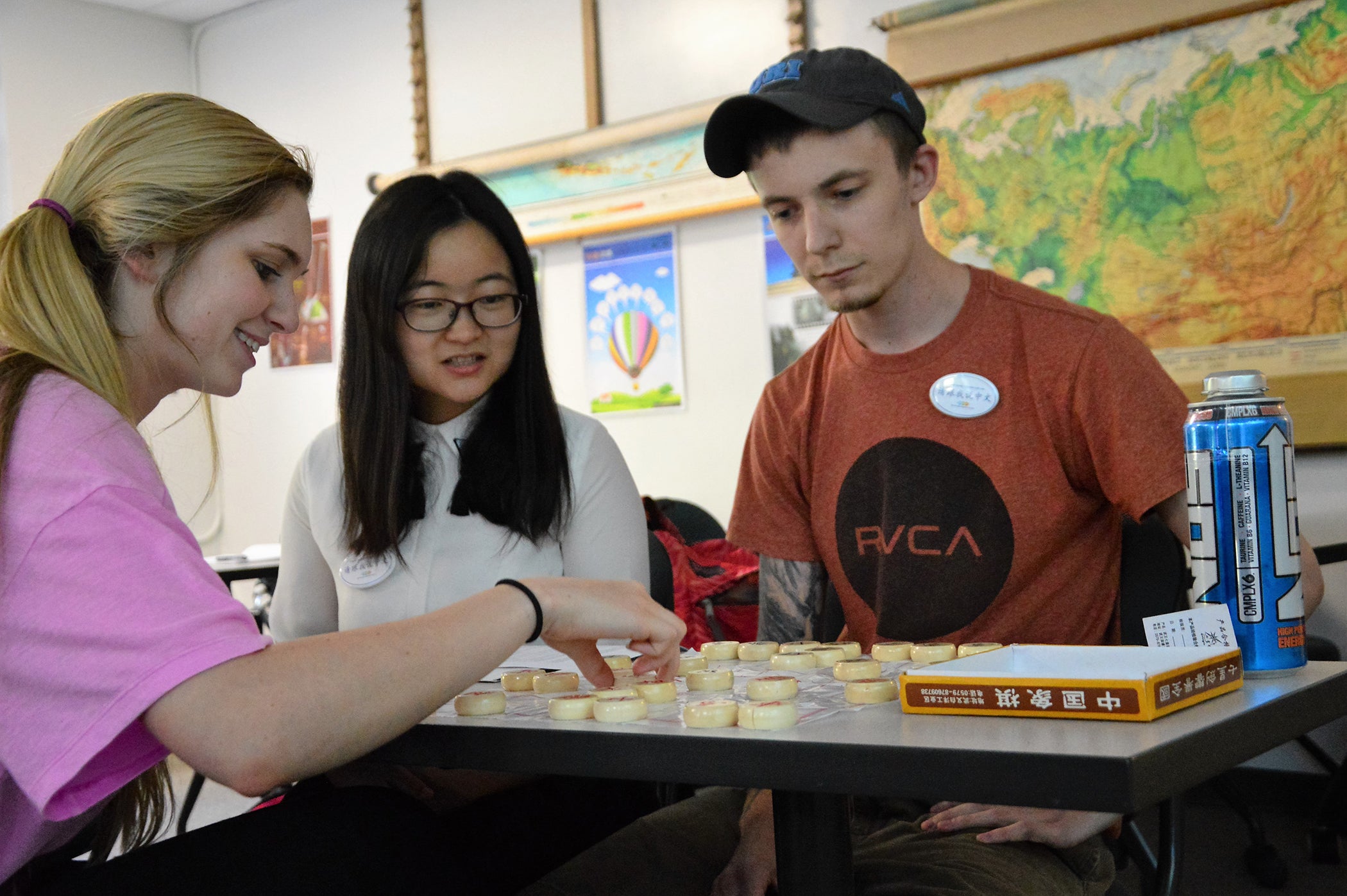KINGSTON, R.I., June 28, 2016—Students at the University of Rhode Island are living and breathing the Chinese language and culture this summer in an intense residential immersion program on the Kingston campus.
If you have any doubt, consider this: The 16 students all wear buttons that say “Please speak Chinese with me.” They sign a pledge promising to speak only Chinese, even in their downtime.
“The program is amazing,” says Zachary Smith, of North Kingstown. “They work us hard, but you learn so much. We’re with each other day and night.”
The goal of the program is to raise the students’ proficiency level from novice to intermediate, which program director Wayne He also describes as “survival Chinese.” The students should be able to communicate successfully when they study abroad in the country next year.
Fifteen of the students are in URI’s Chinese Language Flagship Program. One student is from a university in Georgia. The students, mostly sophomores, are majoring in Chinese and a variety of other fields like marketing, engineering, computer science, business and biology.
Students sleep in the International Engineering Program’s residence halls on campus and have a rigorous schedule. They rise at 7 and eat breakfast. Then, they take Mandarin Chinese language classes from 8 a.m. to noon.
After lunch, they get one-on-one tutoring with a language instructor and participate in cultural activities: kite flying; tea ceremonies; tai chi; Chinese chess; mahjong; and lectures about Chinese history and the economy, among other events. In the evening, the students are required to study for two to three hours.
If students have questions about their homework they can visit with one of the two instructors also living in the residence halls.
Field trips are an important part of the experience. The students recently went to Chinatown in New York, eating in a Chinese restaurant and participating in morning exercises with Chinese-Americans in a local park. Later this week, they plan to visit local Chinese families to prepare traditional meals.
Smith says when he started the program May 30 his Chinese was “not so good.” Now, he says, he can carry on a seamless conversation, and his pronunciation is better too.
“You work so hard here and then you see the results,” says Smith, who is also majoring in electrical engineering and German. “We have classes and homework and activities every day. It’s always with you. That’s a great way to learn the language.”
Chinese is a challenging language to learn. It has different characters than English and four tones in pronunciation. For example, “ma” means different things depending on how the word is pronounced. A flat tone means “mother,” and a tone that goes from high to low then back to high means “horse.”
“Our goal is to bring our students to a superior level in four to five years,” says He. “That means they should be able to use the Chinese language in their professional work.”
Emily Hadfield, of Philadelphia, Pa., who is also studying international business management, says her skills went from “0 to 60 very quickly.” She’s so engaged she’s singing in Chinese in the shower, and even dreaming in Chinese. The other day, she sang “Happy Birthday” in Chinese to her grandmother on the phone.
“I love the community here,” she says. “It’s supportive and encouraging.”
Salita Daraphet, of Northbridge, Mass., feels the same way. Studying, eating and living with other students pursuing the same dream creates a close-knit community.

Photo courtesy of Wayne He.
Keara Cole, also of Philadelphia, appreciates the kindness of the instructors—Xiaoyan Hu, Qingyu Yang, Haiyun Zeng and Hui Tan. “It’s a home away from home,” says Cole, who is also studying computer science. “The teachers really care about us and want us to succeed.”
Hu says the program’s motto is “tiaozhan ziwo, tiantian jinbu”—or “challenge yourself; make progress everyday.”
“These are very motivated students,” Hu says. “They are like my children. It’s fun to see them develop.”
Students give a presentation and receive a certificate when the program ends July 22. The URI students will continue taking Chinese language courses in the fall and most will study abroad in China next summer.
“We’re very proud of our program,” says He. “We think it’s one of the best in the nation. Students come away with a greater appreciation for the language and culture on their path to becoming professionals in a global world.”
For details about the summer program, visit http://web.uri.edu/chineseflagship, or call He at 401-874-4708. Scholarships are available. He is director of the URI Chinese Language Flagship Program and a Chinese professor.
“The program is thriving,” says He. “We welcome applicants for next year.

